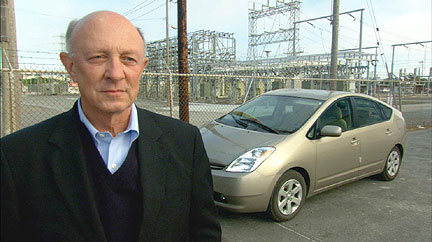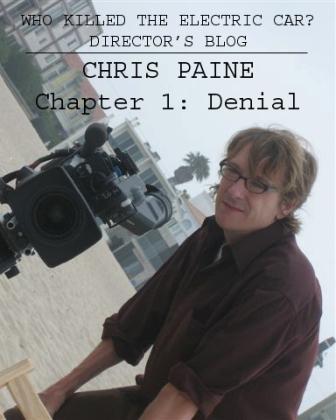By Paige Donner
As a wrap up to Alt Car Expo, film director and electric car lover, Chris Paine, hosted a fundraiser at his L.A. home for Plug In America. Paine's new film, Revenge of the Electric Vehicle will be out in '09. Some of the guests attending were James Woolsey, former Director of the CIA, Chelsea Sexton, electric vehicle evangelist, featured in Paine's first film, Who Killed The Electric Car? Also attending was Dave Barthmuss, electric vehicle spokesman for GM.

James Woolsey, Former Director of the CIA
"...this is not just a movement, this is a revolution..."
James Woolsey: "If 3 out of 4 cars on the road are Chevy Volts or electric vehicles like it from other manufacturers, that have a 40-mile electric range, that is they are all-electric vehicles 3/4 of the time, we are going to see the world change in some very fundamental ways. "
Editor's Note: ["40-mile all electric range," means that for its first 40 miles after it has been charged, the electric-powered vehicle travels purely on electricity. After that first 40 miles, it kicks in to a gasoline/electric hybrid-powered vehicle.]
Woolsey: "Today, at $120 per barrel oil, we ship to OPEC and all the oil producers, net, every year, about $620 billion dollars. And if oil is up at $135 [per barrel] where it was for awhile, we'd be shipping $700 billion a year, which is the same amount of money that everyone is arguing about with respect to the Wall Street Bailout."
"But we send that amount every year to OPEC and we don't get anything back for it. We are indirectly funding terrorism. This is the only war the U.S. has ever fought, except the Civil War, where we pay for both sides. It is madness. We have got to move against oil dependence. Not just foreign oil dependence, but oil dependence, as quickly as possible."
Editor's Note: [As McCain put it during Friday night's presidential debate, the U.S. has lost too much "blood and treasure" and therefore there is no question that America must be pro alternative energy fuels.]
Woolsey: "We need to destroy oil as a strategic commodity. What we mainly need to do is what electricity did to salt at the end of the 19th century. Salt was the only way to preserve meat. And it mattered whether your country had salt mines. Countries went to war over salt mines. It had been true for thousands of years. And then all of a sudden here comes electric grids. Which allowed people to refrigerate and freeze meat. Frozen and thawed meat tastes a lot better than meat that has been soaked in salt brine. So, within a relatively few years, salt was destroyed as a strategic commodity. We still use it. We still buy and sell it. But nobody controls their neighbor's behavior because they have salt mines any more."
"We need to do that to oil. We need to destroy its strategic role and its monopoly over transportation. Electricity, as was the case with salt, is going to be right at the heart of that. It's perfectly reasonable during the transition to try to use more domestic and less foreign oil because it helps with the balance of payments, it helps with the value of the dollar, and if you can do it in an environmentally sound way then it's a reasonable thing. I'm opposed to drilling in Alaska but I think the offshore drilling proposal is a reasonable thing."
Oil and Foreign Relations
Woolsey said that it's not a good idea to let China go hungry for oil. A China hungry for oil puts them in the position of wanting to "make nice" with regimes such as Iran and Sudan whose policies are not U.S. friendly.
On Iran and its nuclear power intentions: Woolsey said that to have an operating nuclear power plant and to claim that it's only for the purposes of generating nuclear-powered electricity is like saying 'We're going to build a truck manufacturing plant that's capable of building trucks and tanks...but we'll only build the trucks.' Iran's quest for nuclear power is fueling a Middle Eastern nuclear arms race, said Woolsey.
In answer to the question, Why don't we follow Brazil's path to its current state of Energy Independence through flex-fuel vehicles?
Woolsey responded that Brazil has a double growing season for sugarcane, which is the crop they use - not corn - to produce their ethanol. He said that cellulosic ethanol manufacturing is becoming increasingly an option as a fuel source and that option will become more and more viable even within the next year or two.
PD: How do you like your own Plug In Hybrid?
Woolsey: Oh, I love it! I have a converted Prius. It takes me 20 miles every day nearly all-electric. For those first 20 miles I get 150 to 200 miles per gallon. In a couple years, when potential car buyers are going into showrooms for Chevy for a Volt or for some other cars that are coming along the salesperson is going to be able to tell them that they're going to be able to drive at a tenth the cost of what they're driving at now. And I'd love it if they're concerned about national security. I'd love it if they're concerned about climate change. But, you know, they don't need to be concerned about either one to want to drive at a tenth the cost of what they're driving at now.
That is not just a movement,that is a revolution. Read more from Woolsey

Chris Paine on The Revenge of The Electric Car
"...this is about the future and the future is now..."
"The last film [Who Killed The Electric Car?]was about change being thwarted or blocked by everyone resisting change, because we all do. It's hard to change. It's easier to do what you did yesterday."
"This movie [Revenge of The Electric Car] is really about our capacity to change as individuals or as corporations like General Motors, for example. This is a story of hope. It should be a lot of fun, too. The 'revenge' part of it is so sweet to see this thing switch around so fast and all the people who were denounced as marginal crazies when these electric cars came out, now people are thinking they were rocket scientists all along."
"We're not here to throw salt in old wounds. We're really making a film about the future.
Dave Barthmuss, GM Spokesman
"...the future of GM lies in electricity..."
"I can't think of a better place to bring this Chevy Volt than to a Plug In America Fundraiser [held at Chris Paine's home, director of Who Killed The Electric Car? following Santa Monica's AltCar Expo]. Because these are the very important stakeholders that had to help us collectively prime the market and get people excited about electric vehicle technology.
On test-driving the Volt
Chris Paine, director of Who Killed The Electric Car?, drove a Volt on September 15th a day before [GM's] Centennial Celebration. He came away very impressed and said that it drives just as good as his EV1, maybe even a little bit better because it's 2008 technology and it's a little bit more refined on the interior."
"The vehicle that we have here is the vehicle that we rolled out for our Centennial where Rick Wagoner [GM Chief Executive] talked about our move from mechanically-driven vehicles to electrically-driven vehicles. And Bob Lutz [GM Vice Chairman] drove it out and this was the personification of where we are heading in the next century."
GM today is not like it was 10 or 15 years ago, nor is the world. We are in the midst of a huge transformation at GM. We are moving from a company that for the last 100 years has been based on mechanically-driven products towards one that will eventually be based on electrically-driven products. That is a huge business proposition for GM. And it can't be understated for people like Rick Wagoner and Bob Lutz to say that the future of GM lies in electricity. Because we can no longer be 96% reliant on a single energy source to power our vehicles at GM."
PD: How soon can the average consumer buy a Chevy Volt?
"By November of 2010 you can walk into a Chevy dealership and either purchase or lease a Chevy Volt. Price point, because it's a Chevrolet, it's supposed to be affordable because that's our affordable, high-volume brand. We don't want to price this so that only the richest celebrity can buy it."
PD: How can people help the process along?
"We need champions in pubic policy forums to help talk about the need for consumer-based incentives that will drive the cost down for early adopters like we had for the EV1. We need to work with various energy companies and utilities for help in putting charging stations in garages so that people who live in apartments, or maybe want to go to Home Depot, can basically plug in from point A to point B. So everybody has to have skin in this game and collectively we have to work together to get the policies and regulations in play to make this thing commercially viable."
"We'll concentrate on building the vehicle but key stakeholder organizations like Plug In America can help prime the market for these vehicles to be ready. We need to put these vehicles out on the road in extremely large numbers. Hundreds of thousands of units, millions of units, if we're going to have a profitable business proposition to go forward with and if we're really going to make a difference to meet our environment and energy concerns and displace the most amount of petroleum."
"We're not going to make a difference if we only sell a very small amount of these to a very select few. This has to be a vehicle for the masses.
Chevrolet is a global brand. We have the ability to potentially sell this in China, in India, to other kinds of nations. We potentially may be able to put this new E-Flex system into other kinds of vehicles. Maybe after the Chevy Volt it goes into something like a crossover vehicle."

Chelsea Sexton, Electric Vehicle Evangelist
"...We need millions of electric cars on the road..."
"Electric vehicles are still a personal passion. It always has been. I didn't come at it completely from the environmental bent. I'm a Geek first, actually, and that's how I came to it. So I spend a lot of time interpreting between the national security hawks and the guys who are really focused on energy security and then the people more on the environmental end."
"At the same time, especially in this economy, it's so much more an economic issue and the fact that you can drive on less than a dollar a gallon equivalent when you use off-peak electricity versus $4 or more for a gallon of gasoline. For a variety of reasons people are coming to the same table and I don't care how you get there. As long as they arrive at the same solution. "
Mainstream vs. Marginalized
"We need millions of electric cars on the road. And we need them built in the 10's and 100's of thousands in order to bring cost down for the average consumer. Certainly, as much as I love Tesla and think they're wicked fun to drive, I could never afford one. I need something a bit more practical and I think a lot of other people do, too. And that requires the involvement of the large manufacturers. "
Follow Paige Donner on Twitter: www.twitter.com/greeninghollywd